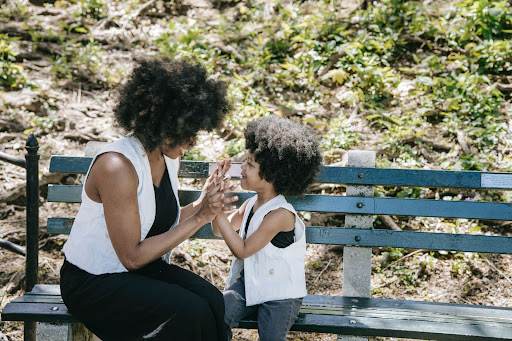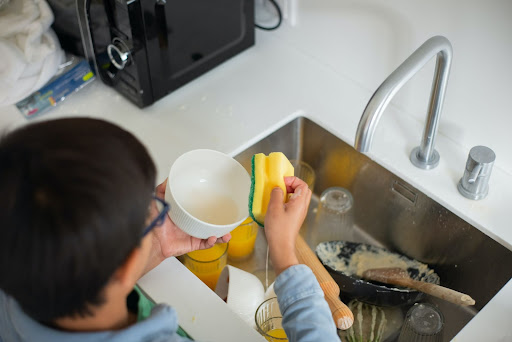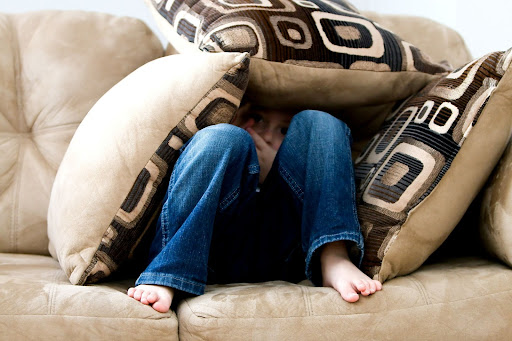How can parents build self-esteem in kids? And is it possible to nurture a child’s mental health? Here’s how to help kids find themselves in an unstable world.
If you were born before 1985, chances are mental health was not a hot topic in your youth. Mental health awareness and mental illness are on the rise, and with this comes heightened mental health concerns for our kids.
Table of Contents
Changes in Childhood Mental Health
Prior to Covid 19, the CDC estimated that 1 in 5 kids had a mental, emotional or behavioral disorder.
After April 2020, the number of children seen in the ER for mental health-related issues rose between 24-31% for young children and teens. Pre or post-Covid, these numbers are extremely high.
Every generation laments their children growing up in a different world. This distress probably dates back to Cain and Abel comparing everything to their experience in the Garden of Eden (and, blaming their parents of course – everything gets blamed on parents).
When your children are babies, you face anxiety primarily over hitting milestones and strange illnesses. You know, those illnesses that always strike in the middle of the night and often come with a high “ewwwwww” factor.
As kids grow older, most parents become less concerned about physical maladies but grow increasingly concerned about their mental wellness.
How Can I Foster Mental Health?
We are told constantly that we need to help our kids grow their self-esteem and be watchful of their mental health, but how? Mental health feels so much more theoretical than physical health.
You get all sorts of thermometers and snot-suckers for your baby shower, but where is the gauge for your child’s self-esteem?
Life would be much easier if we could point one of those lasers at their foreheads and it could read out low, average or high.
But since that’s not in our parental toolbox, we need other ways to foster mental wellness.
Table of Contents
5 Ways to Improve Mental Health and Build Self-Esteem in Kids
When it comes to healthy child development and raising confident kids, there are no silver bullets. But, there are some tried and true strategies for stacking the deck in their mental wellness favor.
1. Self-Care is Critical

Take care of yourself. SA CDC study shows that the mental health of children can be tied to the mental health of their parents and caregivers.
This might seem like common sense, but parents are notoriously bad at self-care. When we become parents we often shift our role in life from being (insert name here) to parent of (insert your child’s name here). This is a noble endeavor, and you cannot be faulted for being unselfish and willing to sacrifice yourself for those you love.
However, sometimes that sacrifice is a double-edged sword, as it is in the case of mental health.
When you fly on a plane, you are always reminded to put your mask on first, because you can’t get your child’s mask on if you’ve passed out.
This is a lesson that has broader implications in life.
Children are sponges who can pick up on silent cues and invisible tension in their homes. Parents often shoulder significant burdens.
Things like: work, aging parents, issues with family, and finances are just a few of the challenges from which we try to shield our kids.
But it is actually good for kids to see their parents address all of these burdens in healthy ways. Children build habits early, most before even turning 9. Teach your child the habit of good self-care.
Let them see you engaging in the self-care you need to keep yourself in the game. This example might just carry them through the same difficult times when they’re in your shoes. This can be modeled directly as well as providing words to support your actions.
Tell your kids, “Mommy needs to go to yoga. My mind and body feel better after I do this.” It’s inevitable for your kids to see you get frustrated and stressed and it’s critical that they see how you handle this and recover.
Tell your kids, “Mommy needs to go to yoga. My mind and body feel better after I do this.” It’s inevitable for your kids to see you get frustrated and stressed and it’s critical that they see how you handle this and recover.
2. Say Yes More Often

Exploration is crucial to mental wellness, and so much of it happens before children even know they’re exploring. Kids do roughly one million things a day where parents have to tell them no (don’t jump from the top of the stairs, don’t stick that up your nose, don’t climb into the dryer, don’t turn on the stove gas).
All of these no’s are necessary just to get to the next day. They’re easy because they’re an immediate risk. It’s the yes’s that can be harder to find, so we just need to look harder.
Create situations where you are saying yes to your children and giving them the freedom they need to make their own decisions and become masters of their own destinies.
According to PsychologyToday.com there is an argument to be made that the lack of free play increases the rates of anxiety and depression in children.
We must find the balance between keeping objects out of noses and fostering children’s adventurous and creative sides.
The tricky part is finding that balance while still addressing our own anxiety (see #1). Saying yes to a 5-year-old painting often results in new wallpaper, and saying yes to a 12-year-old riding her bike to the grocery store often involves breathing into a paper bag.
Take advantage of every tool you have to minimize the stress associated with childhood freedoms, such as creating a little arts and crafts area outside and putting a GPS-enabled watch on a roaming child.
Say yes enough to the right things and your child won’t feel like the world is a barrage of no’s.
Make sure you recognize and reinforce the small successes to encourage more confidence and self-efficacy (or self-esteem) in your child.
Let them know that you appreciate the phone call when they tell you their plans have changed and they are going to the park instead of going to buy gum with a friend.
RELATED ARTICLE: Chores and Allowance List By Age
3. Let Them Achieve

So many parents lay awake at night worrying that we are spoiling our children. This is not just reserved for the uber-wealthy – many of us have the ability to give our kids more than we were given materially, and we find it hard to resist.
There must be a balance between not making your kids do manual labor for 3 hours a day after school and not spoiling them rotten.
The problem with spoiled kids is less about the actual objects that spoil them, and more about the lack of effort it takes them to get those objects.
The solution lies in achievement.
Achievement should lead to internal feelings of pride and accomplishment.
Don’t Say “Good Job,” Instead Say …
As parents, we are quick to praise kids and say “good job” when that continues to reinforce our kids looking for external approval. The next time your child picks up their toys say, “Thank you, it looks like you worked hard. How does it make you feel to do a good job?”
The feeling of accomplishment and fulfillment is going to teach kids self-reliance and how to obtain that good feeling again by themselves. Teaching intrinsic motivation starts early on and needs to be reinforced by our actions and comments as parents.
“Achievement and Depression are Inversely Related.”
Dr. Jennifer Gatt, Child Psychologist, Advising Board Member at My First Nest Egg
We need to change how our kids ask for things from “I want” to “I want to earn.”
No one ever looked at a successful adult who worked like crazy to put herself through school, and dedicated years to a 60-hour work week, and said – “she’s spoiled.”
We recognize that working for something brings with it a pride of ownership that is frequently superior to things given freely.
2 Reasons that Kids Can and Should be Earning
There are two mental health side effects to reaching goals and accomplishing difficult tasks.
It will have the twofold effect of:
- Teaching them the value of money
- Making them less susceptible to depression.
Start by having your child make their bed every morning possible. There is something that feels so good about a made bed. It is a constant reminder that you achieved at least one thing that day.
You will absolutely encounter the tried and true anti-bed-making mantra that it’s useless since it will just get messy in 12 hours. That is okay – and accurate for little minds.
Gently remind them that it’s easier to find things in a clean room, and a clean room starts with a made bed.
Little achievements build into big achievements, and soon your child will be making beds, cleaning rooms, and offering to do dishes. You can reward them with positive reinforcement, allowance, and/or those random little things you were going to buy them anyway, but now they have earned.
You may have to overtly model the feelings that come with accomplishment.
For instance, after folding all the laundry you may say, “Wow, that feels good to get that done and everything in place.”
You can also assist your child to come up with the self-statement.
“How does it feel to finish your chores early?” You may get the shrug or “I don’t know” statement. But provide your child the language, such as, “I bet you feel proud!”
Further that with asking your young child to show you their “proud face.” The effort is in trying to get your child to feel and own that feeling of achievement within themself.
4. Listen…and Believe

Kids tend to rattle on about everything and nothing all at once. It’s amazing how you can know so much about a discreet conversation your 8-year-old had at lunch with her best friend’s sister, but have no idea whether she knows how to multiply two-digit numbers.
Children’s minds work differently from adults.
A Birthday Comparison Meltdown
I had a distraught 5-year-old on my hands recently.
We had spent the day celebrating his sister’s birthday, and he was absolutely positive that we had not similarly celebrated his special day. He was ugly snot crying and throwing a completely unwarranted tantrum.
The truth is, he was being ridiculous.
Every birthday is celebrated with similar over-the-top pomp and ceremony, and his birthday was no exception.
We are a far cry from my childhood celebrations of homemade sheet cakes (frosting optional) and a new pair of shoes.
So, my first instinct was to put him in a time-out.
Then I had a thought – what if, in his little brain, he actually thinks we didn’t celebrate his birthday?
I corralled him on my lap and pulled out my phone, the repository of six million pictures that will never see the light of day.
I opened to his birthday morning and one by one went through photographic and video evidence proving that he did indeed have an epic birthday.
As we went through the pictures, he stopped crying. By the end he was elated.
The poor kid actually did not remember his birthday celebrations. I asked him how he felt when we were done and he said one word: loved.
It was a learning moment for me more than him and shifted the way I listen to my kids.
Validating Instead of Dismissing Feelings
When children tell you something is bothering, frustrating, or angering them, those feelings are very real. So much of parenting is finding ways to deal with intense and real feelings which are completely unreasonable in our adult world.
Dismissing those feelings lowers children’s self-esteem.
If I had dismissed my child’s feelings he would have gone to bed fully believing that he was less loved than his sister.
That is as catastrophic as it is false. And I have receipts.
Listening to kids and taking their perceptions at face value builds their self-esteem. This is because the most important adults in their lives think they are important enough to be heard. And they feel loved, secure and confident.
5. Let Them Fail, Securely

Success is most often achieved by those willing to fail.
This is a truism we hear over and over in life as we all desperately try to avoid failure.
It is one of those fun little contradictions we just learn to deal with as adults: like, accept your body but go to the gym 7 days a week and avoid carbs.
Or, it’s inspiring to be a working mom, but never tell someone you can’t make a meeting after 3 because you have to pick up your kids.
There’s no getting around these little conundrums, so we just have to go through them.
The best way to express this to kids is to make sure they never equate failing with being a failure.
Failing is normal, feeling like a failure is depressing.
Setting kids up for success means letting them fail early and often (see the Great Sea Monkey Debacle of 1985). This builds their self-confidence and autonomy.
As parents, we have a tremendous amount of influence over our children, even if it doesn’t feel that way sometimes.
When we give our kids room to be independent and try things on their own, we are telling them that we have confidence in them. We believe in them. We know they can succeed.
That confidence is infectious, and it will help them believe in themselves as they work through all of the normal adolescent pitfalls and mistakes.
“Encourage and support your kids because children are apt to live up to what you believe of them.”
Lady Bird Johnson
Just as important, we must give children a soft place to land.
This is the security kids crave. Oftentimes parents complain to teachers that their kids are perfect in school and not-so-perfect at home.
The response is almost always the same: good. This means that you, as a parent, have created a safe and secure environment for your child where they can act out, make mistakes, and get in trouble.
Those same behaviors which might get them suspended at school will not get them suspended from your family. That secure, loving environment is exactly what children need for their mental wellness. They can go out, explore, make mistakes, succeed, and come home to unconditional love.
Conclusion
The bottom line is that modern children are facing an array of different and confusing challenges.
This isn’t to say they are more or less difficult to build self-esteem in kids than in previous generations. Very few kids have to walk both ways uphill in the snow to school, but they do have to contend with the insane world of social media. The challenges today are just new and different.
The necessary ingredients for mental health and a positive self-esteem in kids have not changed.
Kids still benefit from:
- mentally healthy parents
- security at home
- an understanding ear
- a push to achieve and explore
- and an opportunity to grow into their confident selves.
At the end of the day, that is the very best we can do. And, just in case, save the receipts.
